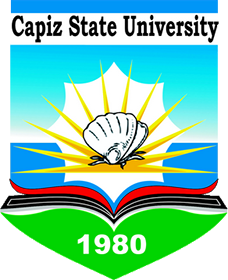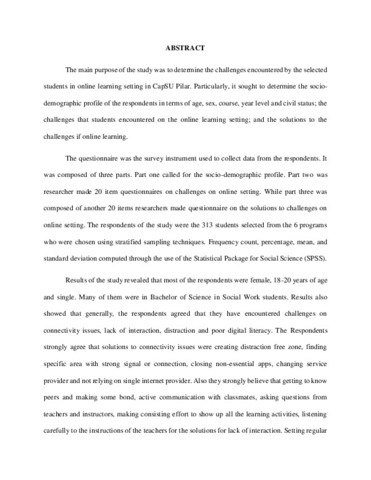Challenges encountered by the students in the online learning setting in CAPSU Pilar
| dc.contributor.advisor | Tomco, Fabian D. | |
| dc.contributor.author | Mula, Silme Joy B. | |
| dc.contributor.author | Vallar, Noime B. | |
| dc.coverage.spatial | Pilar | en |
| dc.date.accessioned | 2024-04-24T06:02:20Z | |
| dc.date.available | 2024-04-24T06:02:20Z | |
| dc.date.issued | 2023-06 | |
| dc.identifier.citation | Mula, S.J.B., & Vallar, N.B. (2023). Challenges encountered by the students in the online learning setting in CAPSU Pilar [Undergraduate thesis, Capiz State University Pilar Satellite College]. CAPSU Institutional Repository. | en |
| dc.identifier.uri | https://repository.capsu.edu.ph/handle/123456789/590 | |
| dc.description.abstract | The main purpose of the study was to determine the challenges encountered by the selected students in online learning setting in CapSU Pilar. Particularly, it sought to determine the socio-demographic profile of the respondents in terms of age, sex, course, year level and civil status; the challenges that students encountered on the online learning setting; and the solutions to the challenges if online learning. The questionnaire was the survey instrument used to collect data from the respondents. It was composed of three parts. Part one called for the socio-demographic profile. Part two was researcher made 20 item questionnaires on challenges on online setting. While part three was composed of another 20 items researchers made questionnaire on the solutions to challenges on online setting. The respondents of the study were the 313 students selected from the 6 programs who were chosen using stratified sampling techniques. Frequency count, percentage, mean, and standard deviation computed through the use of the Statistical Package for Social Science (SPSS). Results of the study revealed that most of the respondents were female, 18-20 years of age and single. Many of them were in Bachelor of Science in Social Work students. Results also showed that generally, the respondents agreed that they have encountered challenges on connectivity issues, lack of interaction, distraction and poor digital literacy. The Respondents strongly agree that solutions to connectivity issues were creating distraction free zone, finding specific area with strong signal or connection, closing non-essential apps, changing service provider and not relying on single internet provider. Also they strongly believe that getting to know peers and making some bond, active communication with classmates, asking questions from teachers and instructors, making consisting effort to show up all the learning activities, listening carefully to the instructions of the teachers for the solutions for lack of interaction. Setting regular days and time to attend virtual classes, using a calendar of upcoming tasks, cancelling out distractions, breaking down big assignments into smaller goals and avoiding distractions where the solutions to challenges to distractions. Moreover, researching on good application to use on attending online learning, borrowing gadgets from family members, familiarizing how to particular application, seeking help from someone who knows how to use application and researching and researching and learning how application works are the solution to the challenges of poor digital literacy. | en |
| dc.language.iso | en | en |
| dc.publisher | Pilar Satellite College, Capiz State University | en |
| dc.subject | Challenges encountered by the students | en |
| dc.subject | Online learning setting | en |
| dc.title | Challenges encountered by the students in the online learning setting in CAPSU Pilar | en |
| dc.type | Thesis | en |
| dc.contributor.chair | Tomco, Fabian D. | |
| dc.contributor.committeemember | Contreras, Eric Esteban B. | |
| dc.contributor.committeemember | Delamide, Deolinda B. | |
| thesis.degree.discipline | Elementary Education | en |
| thesis.degree.grantor | Capiz State University Pilar Satellite College | en |
| thesis.degree.level | Undergraduate | en |
| thesis.degree.name | Bachelor in Elementary Education | en |
| thesis.degree.department | Teacher Education | en |
Files in this item
This item appears in the following Collection(s)
-
Undergraduate Theses [440]

